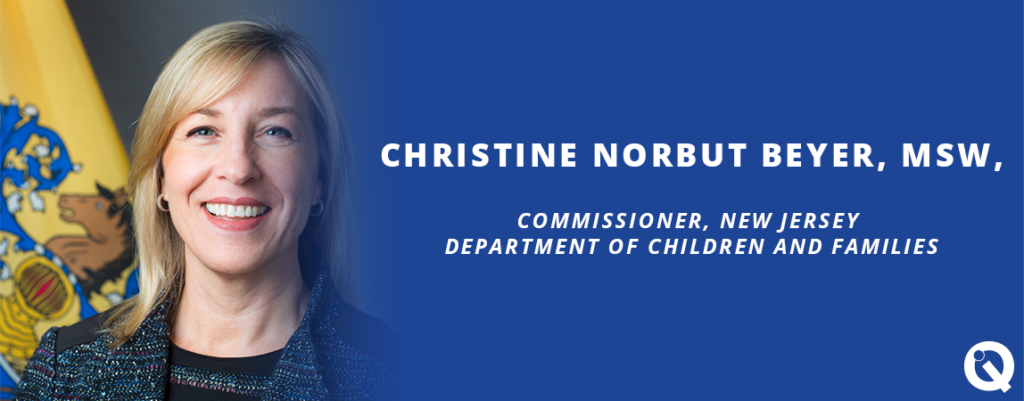Commissioner Christine Norbut Beyer, MSW, is Commissioner of the New Jersey Department of Children and Families. The Department of Children and Families is prevention-focused, promoting strong and healthy families, and providing evidence-based support and services to keep all New Jerseyans safe, healthy, and connected.
How is your department designing the Universal Voluntary Nurse Home Visitation Program?
Governor Murphy signed legislation in July of 2021 to enable the creation of this statewide universal home visiting program for all newborns in New Jersey. And we’re excited that we’re the second state in the country to have a statewide program. We identified Family Connects International as the model that best aligns here. We developed an advisory group and smaller subgroups focused on implementation, communication, evaluation, and insurance, whether private insurance or Medicaid. We have a nursing shortage in the country, and in New Jersey we are feeling it significantly. So, we are really thinking about how to best attract nurses to this work and not taking nurses away from other important work being done in the state.
What’s most exciting to you about the program?
I think the universality of the program. It’s available for everyone, regardless of income or where you live. Our goal with this is to reduce maternal and infant morbidity and mortality and reduce disparities. We want to catch health issues or concerns that arise after birth, either for the child or the parent. A lot of women don’t always feel they are being listened to, or they feel their symptoms are downplayed. We had the opportunity with the First Lady through her NurtureNJ program to hear directly from women across the state and from men who have lost their wives about post childbirth issues that might have been addressed with a home visitation program. I’m really excited about what this program can do for the health of women and children in the state.
How will you share information about the program and evaluate its value?
The evaluation process is a collaboration with Johns Hopkins University. We already have a contract with them for our other home visitation programs in the state. We currently have evidence-based home visiting programs in all 21 counties. And we’re expanding that contract to evaluate this service as well.
And our partnership with the Burke Foundation to build awareness for this program is around research and messaging efforts. We want our reach to be broad. This program is for all people in the state who give birth, regardless of socioeconomic status or where they live. It’s purely voluntary. It’s offered to all birthing families and to adoptive families, foster families, and families that experience a still birth. We want people to understand that this is a public health program — not a social service program. I think that’s unique, the universality of the program.
We will have work to do around communication. We want to make sure that people understand that this is about women’s health. It’s about infant health. There were some concerns about having this in our department because we also have Child Protection and Permanency. But we run many programs, in areas such as behavioral health, for families that never involve protective services. Our whole department is working to reorient around prevention — so this fits in well.
How does it link to the other programs and services in the DCF umbrella?
Universal home visiting will be nested within the existing service array that’s available from pregnancy to children aged five in our Division of Family and Community Partnerships. A major component of the model is the identification of and referral to community service. That means basic health care or supports. We have 57 Family Success Centers across the state where families can seek support. We’ll be partnering with doula programs, early childhood specialists, infant mental health services — all are contained within our department. We can make direct connections to programs such as Healthy Steps, WIC, SNAP or TANF.
We like to ask a question beyond the professional lives of people we interview. Where might we find you on a day away from work?
You will probably find me hiking in the woods. I love the woods, or, in the summer, lying by my pool. I like the solitude to reflect after the challenging work I do. Oh, and I love spending time with my COVID kitten.

